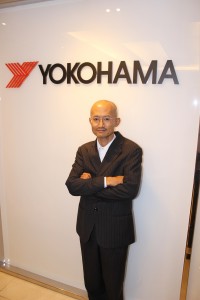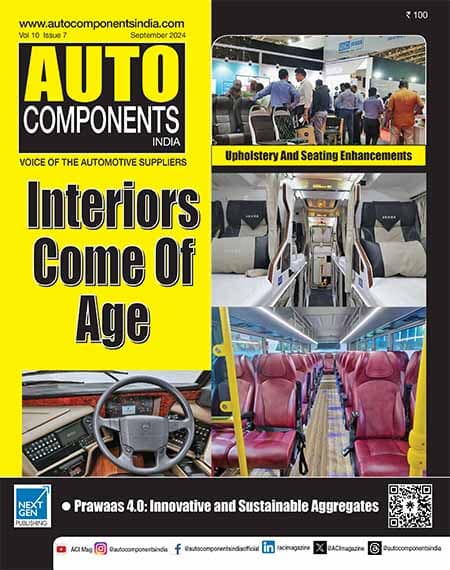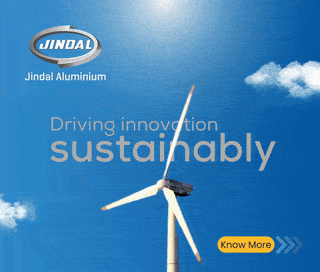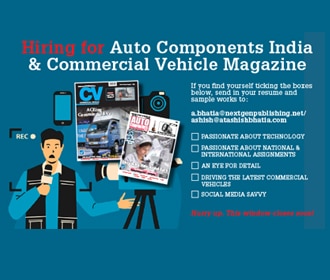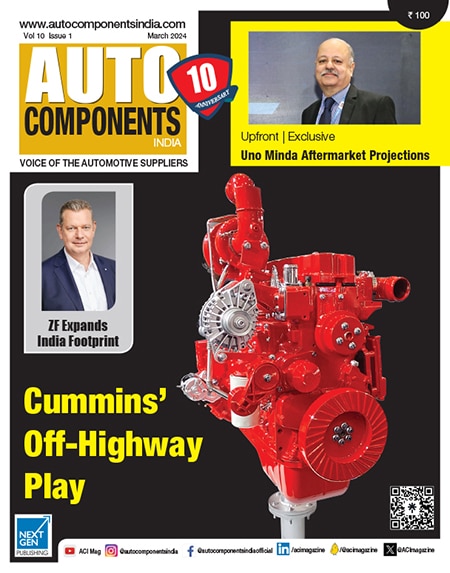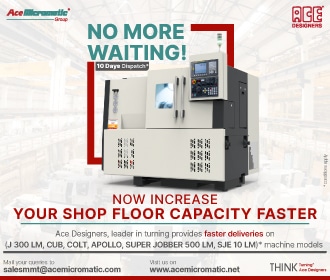Yokohama India, the fully owned subsidiary of Yokohama Rubber Company, recently commenced commercial manufacturing at its plant in Bahadurgarh, Haryana which is its first plant in the country. Takeshi Fujino, Managing Director, Yokohama India, spoke to J Srikant on the significance of the new plant for Yokohama Rubber Company globally and how it plans to grow its footprint in India going forward. Edited excerpts:
Q: Congratulations on your new plant, the first one in India. How significant is this event for Yokohama globally?
Fujino: Thank you very much. For Yokohama group globally, India is one of the most important markets, just like China and Russia. We could finally start our commercial production operations in India and this was a big event for the Yokohama group. The group president also came down to India to inaugurate the plant which shows the importance of this country for the group. End of last year, we completed construction of the plant and early this year, in January, we started trial production. After adjusting the manufacturing processes, we started mass trial production in May. End of July, we started production to pile up stocks. And in October we started the commercial products. We still do have imported tyres being sold in India because the inventory is still not enough to meet the market demand.
Q: Where does India fit into Yokohama’s plans for global expansion?
Fujino: Basically, Yokohama group strategy is that if there is a big market in a country, we will have a manufacturing plant in that country. And the products manufactured in that factory will be consumed in the same market. Like in Russia, we have a factory and the produce is consumed in Russia. Similarly in China, the factory there provides for that market. India too is a big market for us and the tyres produced here will be sold in India only, at least for the time being. We have manufacturing plants in countries like Philippines and Thailand where the domestic market is very small. It is those countries which are the export hubs for Yokohama group. From these two countries we are exporting to all over the world except to big markets like China, Russia and Japan. At present there are no plans to export from India. But there is still room for expansion in India and if the possibility arises for exports, at that time, we will study the situation and decide.
Q: How timely do you think is this push into the Indian market keeping in mind the huge slump that the Indian auto industry has just been through?
Fujino: That is a bit difficult to say at this moment. In India, we started sales in 2007 after which we realised the necessity of local manufacturing. But it took time as 7 years had already passed since then. During that time, there was an economic crisis in the global market so our plan to open the factory was postponed. In 2011, management decided to go ahead with the plant and the construction started in the year 2012. There were already many tyre brands by then in India. So, you could say we are a little bit late in introducing our plant in India but now we would like to accelerate manufacturing in India. But in the long run, since Indian tyre market is now again growing along with the automotive market, so in that sense, we can say this is a good time to start local manufacturing.
Also, the economic condition in automotive and tyre industry is not very related. It is seen that when auto sales are going down, people tend to not change cars but replace tyres which gives us the chance to sell more tyres in the aftermarket. But the negative is that when car sales are going down, production is also going down, which means the tyres that were to go to the OEMs now enter the aftermarket, making it highly competitive. This was the situation in 2012-13. But this year, there has been some recovery and next year too we could see better sales, so a good time to manufacture.
Q: Up till now, you have been importing the tyres. Now that you are going to manufacture in India, will imports stop?
Fujino: We have been importing tyres to India from Japan and Philippines so far. But now we will start importing from Thailand. The tyre categories which are imported are completely different. Japan is mostly for the high-end category whereas the Philippines are for mass market tyres. While these two are for smaller passenger tyres, from Thailand we will be importing the SUV tyres.
Q: What are the challenges that you foresee in manufacturing in India and how are you preparing to tackle them?
Fujino: Right now, the number of units that we sell in the market is less than the total capacity which we will touch in next 2 years. So, as the production expands, our sales too have to increase. That is the biggest challenge that we are facing today. But given our 7-year experience in India, we are sure that we will be able to sell as many units. The other challenge is sourcing of material locally.
Q: What will be your sourcing strategy? Will all the raw material be sourced from India? What will be the share of imported material in your tyres manufactured here?
Fujino: Currently, almost half of the raw material we use for production is imported. So to stabilize our manufacturing cost, we have to increase the local portion in the near future. So, as mentioned, next year the challenge for us is also to source more from here. Even natural rubber is mostly imported but we are planning to source natural rubber locally. As you know, there are many tyre manufacturers in India, where natural rubber production is limited, so it is difficult to say how much we will be able to source locally and what portion of it will be imported. It all depends on the quality of the material and also on the negotiations with the suppliers.
Q: What are your views on the quality of raw material that you find in India? Do you think it is suitable for manufacturing global standard tyres?
Fujino: Well, I am not from a technical background so not familiar with the chemistry of it. But depending on the feedback of our technical departments and their judgement, I think there is a big possibility to source good quality raw material locally. And we will decide to source locally only when the quality is of global standards even though right now we are planning to sell only in the Indian market. Our focus is always to meet global quality standards. In some aspects the Indian market is very special, like durability and mileage. So Earth-1 that we launched is made considering the Indian condition and usage, and is only developed for India but the process followed for manufacturing is the same as anywhere in the world.
Q: Tell us more about the plant. What is the current capacity and how much can it go up to?
Fujino: Within this year, we are targeting to manufacture 1,000 tyres per day. By end of next year, we are hoping to have 1,500-1,600 tyres per day and sometime in 2016, we will touch 2,000 tyres per day which is the current maximum installed capacity. Depending on our sales performance we will expand the factory. The area of the plant is 25 acres and we are at present using just one-fourth of it. So there is room to expand to 4 times the current capacity which is 8,000 tyres per day. Of course, it depends on the tyre size as well. If bigger tyres are manufactured, the number of tyres per day is bound to be less.
Q: What is the investment that has been put into the plant? How many jobs will be created because of the plant?
Fujino: In this plant, till now we have invested Rs 300 crore. When we reach to maximum capacity, our number of employees would be around 400 in India. By end of this year, we will already be around 300 employees in Yokohama India.
Q: 8,000 tyres per day is the maximum this plant can produce. Don’t you think this would be inadequate when you start serving the OEMs as well, here in India?
Fujino: True, in the long run we will have business with car manufacturers as well. But for the time being we are focusing on high quality production, which means the cost is not very low. To do business with car manufacturers, price is a key factor. After some experience of factory operations, we will study business with car manufacturers as well. As a tendency, globally, we do more business with Japanese car manufacturers and we do think that association will help us in India as well. But if there is a chance to engage with OEMs of other countries, we will look into it. At that time we will see if this capacity is adequate or not. We will grow this factory in 4 phases. This is just phase 1.
Q: What are the reasons for you to not look at the CV segment at all? Is it the downturn in the segment that has put off your plans?
Fujino: I agree that the CV tyre demand in India is huge. However, there are already so many Indian tyre manufacturers and imported brands present here which means the price competitiveness is more than in the passenger car market. At first, we would like to focus on the passenger and SUV category. Also, in India, CV market is still primarily bias tyres but Yokohama already backed out from bias segment because as a global player, it is tough to compete with the numerous local players in each country like China, Thailand, Indonesia who sell bias tyres at much cheaper rates. So we had to concentrate on radial tyres. Right now, it is tough for us to enter such markets. But in future, with improvement in infrastructure and logistics, and when radialisation increases in CV segment, we will study these markets.
Q: Which products will you be manufacturing in India?
Fujino: For the time being, we will continue with Earth-1 and S-Drive. In case of passenger cars, there are so many categories like high-performance, high-durability, sporty-type, luxury. Earth-1 is right in the centre of this performance map which is targeted on the mass market. S-Drive on the other hand is a bit towards the sporty side. Earth-1 will have 25 sizes and S-Drive will have 10 sizes manufactured here at this plant. Of course, there is big room to expand the product line in India and we will examine what kind of tyres we can produce in the next stage along with the current 2 models.
Q: Your tyres are well accepted globally. How would you differentiate your product from the competition?
Fujino: Before we introduced the Earth-1 tyres here, we did a year-long field monitor test and based on those experiences we realised some key factors sought after in India like durability, comfort and mileage. Indian road condition is now getting better and people are looking at various aspects, unlike earlier when people did not care much about the tyre noise, riding comfort and looked only at durability and mileage. But now, while durability is still the primary concern, customers are looking at the other mentioned factors as well. And we all know that these two factors are inversely related. So we created a tyre where all these factors are achieved at high levels without much compromise.
Q: The Earth-1 tyres you say are designed and developed specifically for India. What are the differences?
Fujino: Honestly speaking, in other big countries like China and Russia, durability is not that big a factor. That is the big difference.
Q: In a vehicle, tyres probably have the highest ecological footprint? What is Yokohama doing to reduce this?
Fujino: Yokohama is trying to use more of the natural resources and not the chemical parts. For example, for manufacturing tyres we are using a certain kind of oil which is extracted from orange which is quite good for enhancing the character of the tyre. India has just started in this path so in future we will focus on such aspects which we are using globally for manufacturing.
Q: Could you please shed some light on the future of tyre technology? In the next 10 years, what is going to change drastically in a tyre, materially or production-wise?
Fujino: I believe the next big technology upgrade will be related to the environment as many manufacturers are trying different things, like Yokohama is working with the oil from orange. In countries like India, if infrastructure improves, within a few years we could see much lighter tyres which will help in bettering fuel consumption, which in turn will again have a positive ecological impact.
Q: Now that Yokohama has a manufacturing plant in India, when can we expect a development centre here?
Fujino: We developed Earth-1 especially for India but the designing of it was done in Japan. We expect that similar functions will be transferred to our factory in India. At present, I cannot say how this will go forward, but personally I believe we have to segregate some functions in the development process that can be done locally and some that will be continued in the Japan centre. We do have a small lab in this factory which is for quality testing of raw material and finished product.
Q: India is a very price conscious market which Yokohama would have realised in the 7 years of its operations in India. How are you going to produce tyres at a low cost while maintaining the same quality?
Fujino: It is to make our products more price-competitive that we started manufacturing in India. If we had continued with only imported tyres it would have been tough to survive. India is quite protective towards Indian manufacturers. The duties are a little towards the higher side, and complying with BIS standards is quite a complicated and costly affair for imported products. That is why it is better to have a local facility. Within a few months, imports of products which are manufactured in India will completely disappear. Basically, our strategy is to provide good, quality products, in time, at suitable prices. So, even before local manufacturing has started, we have adjusted the price of the tyres to be competitive in the market.
Q: What is your strategy on branded dealerships?
Fujino: We call them the YCN, Yokohama Club Network. We are appointing some good and loyal dealers to become our YCN. At present, we have a bit more than 20 shops and we hope to add similar numbers every year. Within a few years we would want more than a hundred such shops across India, primarily in the big cities.
Q: What are your short term and long term goals for India?
Fujino: Not just the short term, even in the long term our main goal is to expand the business in India. It is quite difficult to survive with products only for the mass market. We have to differentiate from other makers and have a more independent existence. We will focus on high-end products like our advance-sport brand which is approved and used by many OEMs like Porsche and Audi. Through these products, we would expand our name – that Yokohama is also good for high-end products. We would like to have a certain volume and market share in all segments. Yokohama’s strength is high quality and high performance tyres and we would like to contribute to the Indian tyre industry with such products, and also help in the development of the automotive industry in India.


